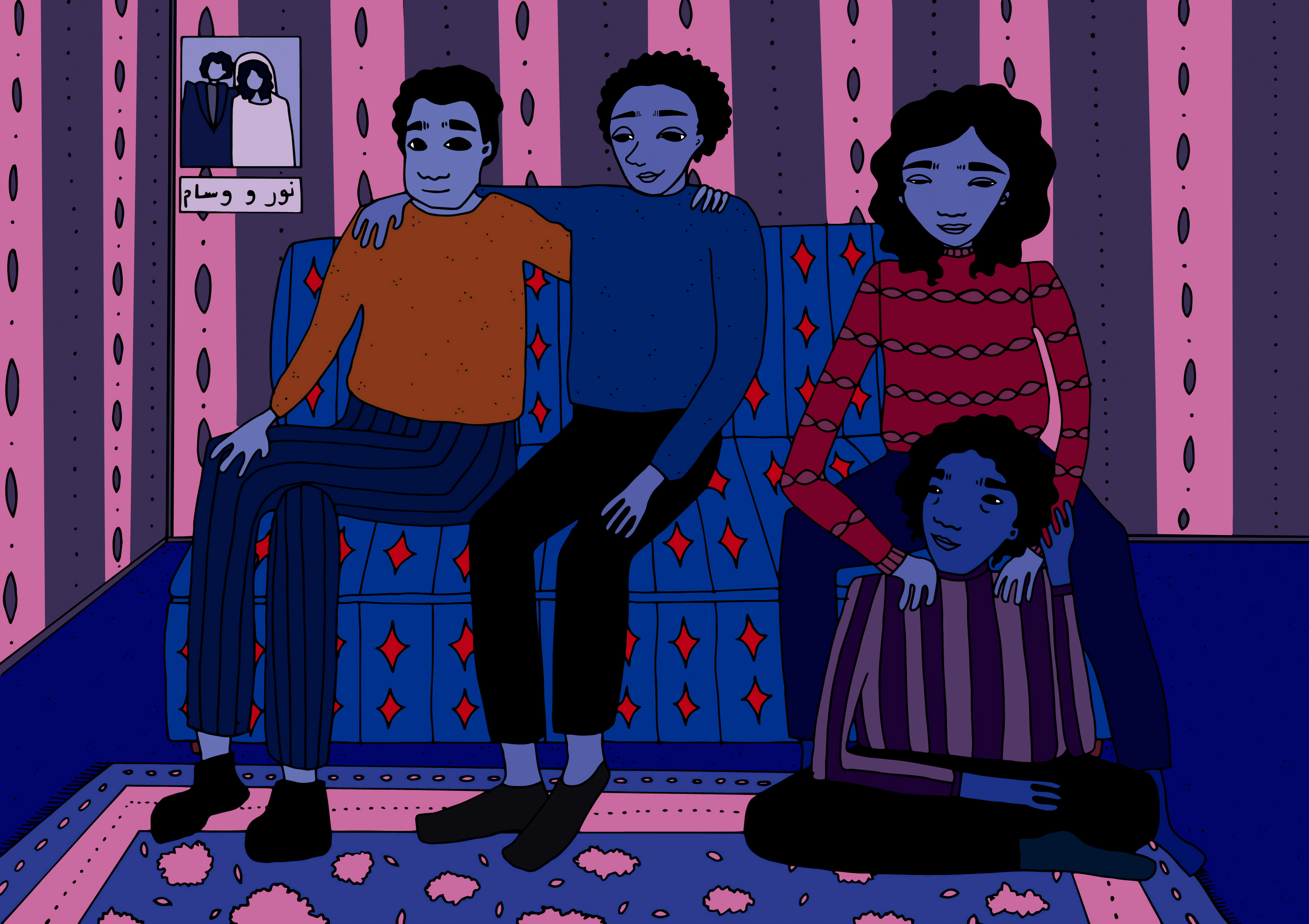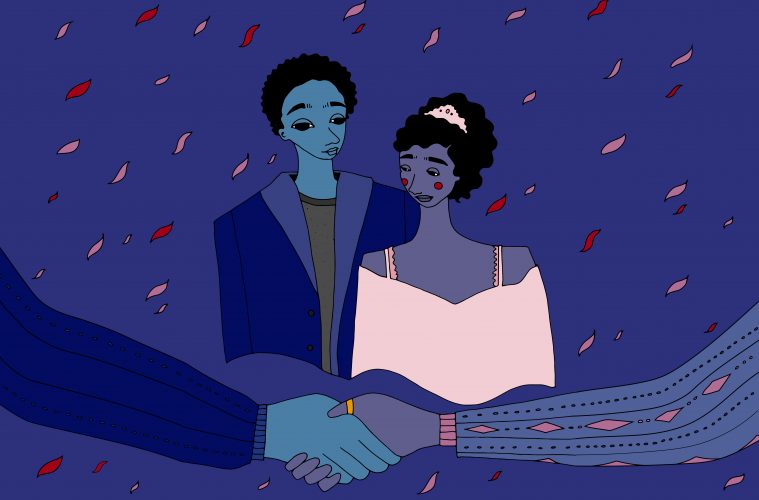بالعربي
Written by Shusha
Translated by N.H.
Artwork by Aude Nasr
This piece is from the ‘Weddings & Marriages’ issue (here)
Some see marriage as a form of commitment, an opening into a new life with family and children. Some see marriage as confinement, as something that binds one’s life to another’s. Some see it as a catalyst of change, as an opportunity to move into a new environment and receive certain benefits that can vary person to person, such as obtaining a less restrictive lifestyle, traveling abroad, changing nationality, money, or protection. These benefits allow a person to appear “normal” by societal standards, and thus able to escape from societal or family pressures. “Marriages of convenience,” or “cover-up marriages,” the focus of this article, fall most clearly into this final category.
“Marriages of convenience” appear like many other legal marriages, except that both parties agree prior to marrying that their marriage would not entail the kinds of intimacy one might expect in a “real” marriage. Such a contract allows people who suffer from societal and family pressures, including some gay men, women, and non-binary people, to get married, leave their families, and gain more independence and mobility. Some even prefer this because they can lead a different kind of life without subjecting another to deception or false expectation.
Wissam spoke with us to share her experience in a marriage of convenience with her husband, Nour, including what led to this kind relationship, how it helped, and benefits and challenges they have encountered along the way.
Wissam, can you give us some background to your relationship with Nour?
During my second year of university, I got engaged. My family forced me to do so because they deemed the man who proposed to be well-off and the match as suitable. I was still a university student at the time, and wasn’t really able to refuse an arrangement like this. We got engaged, and I spent two whole years avoiding my fiancé every time he tried to get close to me. I would justify my aloofness by saying I knew nothing about sex and that these things made me nervous. Things stayed this way between us until I graduated. We were supposed to get married, but I felt like a countdown had begun, and that I needed to get out of the situation as soon as possible. I tried to push him away using very unkind methods. I became aggressive and curt with him. I created problems whenever possible.
We eventually broke up and life became good again, but I felt very guilty toward my ex-fiancé. I felt bad that he had wasted two years of his life waiting for me to graduate so we could get married. I decided then that I didn’t want this to happen again. I didn’t want to lie to anyone or for anyone to get attached to me. At the time, I was with a girl I used to know from school. She decided to help me. She said she would find me a gay man to marry. It would be a marriage of convenience.
My girlfriend was very much involved in the gay community and knew quite a lot of people. She started introducing me to people. Every time I met someone new, things would look good on paper, but different problems arose each time that would call the arrangement off. Some of them changed their minds last second, some would back out—afraid that the whole thing would be found out and that they would shoulder most of the blame. Other times, I would refuse a match, because the guy appeared too effeminate and I was afraid that would arouse my parents’ suspicion.
The pressure from my parents continued to intensify. I felt like I was given a deadline I would never meet. I decided then to pursue a master’s degree to get my parents off my back for a bit and to buy myself more time. I started my studies and forgot about the whole thing for a while, until my friend introduced me to Nour, someone who was very serious about getting married as soon as possible. I met him, and we talked, and began to meet often. We became actual close friends. Our situations suited one another very well. We decided that everything would be purely for show, meaning that I would even return the gifts he bought me and give him back the money.
Nour met my family immediately after. The first meeting was very difficult for me. I’ll never forget how all over the place and scared I was. I felt like I was conning them. I felt the way I did the first time I masturbated: embarrassed and guilty. But my family thought the meeting went splendidly. They were incredibly happy, like I was a burden they were excited to get rid of. They also felt good about the whole thing because I had complicated things on my end, which made them loosen up regarding other details, such as dowry and other things.
We got married and things went well. I even returned my gold and dowry to him. At the beginning, things were perfect. It was a dream come true, as they say. My girlfriend was always over, and our love story was blossoming. Nour was finally relieved of the pressure his family had put on him. They now left him alone and began to really respect him. Life was rosy.
“Never in my life could I have imagined things to go this way. I don’t regret this decision one bit. On the contrary, I gained a person I can say I want to grow old with.”
After a while, however, a new form of pressure arose: pregnancy and children. We had been expecting these things, but it was still a lot more difficult than we had expected. We tried to convince our families that it was still far too early to have children, and that we wanted to spend time alone before having children. Two years went by, and our families drove us insane: medical advice, doctor visits, visits to sheikhs, etc. In the end, we decided that we’d each tell our families that we had problems that prevented us from having children, that we were both completely sterile. I told my family that I was sterile, and he told his that he was sterile. This made our lives easier, and circumvented the possibility of his family suggesting that he marry another woman.
With time, Nour and I became inseparable. We became attached to one another, more than just friends or siblings. He became a part of me that I could never give up. We had initially intended for this marriage to be temporary, but after we got married, we became very close and grew to love one another very, very much. We currently live in a Gulf country together. We each have our own privacy and separate sex lives, but we live together as best friends, and spouses who love one another very much in front of other people.
Never in my life could I have imagined things to go this way. I don’t regret this decision one bit. On the contrary, I gained a person I can say I want to grow old with. And what’s nice about our marriage is that there’s no jealousy, sex, or marital problems.

Artwork by Aude Nasr
What’s the most difficult problem you’ve faced?
The hardest thing is family visits, because I still feel like a con person and liar. I thought I’d get used to the feeling by now, but it never goes away.
What were some of your fears regarding this marriage?
There was a lot of fear when we were living in Jordan. We felt like we were criminals and were constantly scared of getting caught. However, this fear went away when we moved abroad, because we were away from our families and away from people’s prying eyes.
What changed on the personal level after getting married?
Nour has become much more discreet about his sexuality. Before we got married, he was more relaxed about it and went to a lot of gay gatherings and had a lot of gay friends. After we got married, though, he went to fewer of these functions and activities and avoided anything that could reveal his sexual orientation. Little changed for me regarding my way of life; I was never very much involved with the lesbian community to begin with.
Do you recommend marriages of convenience to other people?
That’s a tough question. I can’t encourage other people to try this type of marriage because it is very high risk, especially since so few people who will know the truth about this marriage, and they could use that information as blackmail material. My personal experience has been successful. It is truly a marriage of convenience and comfort, but that’s not always the case. There are others who have been subjected to blackmail because of it.
How do your friends who know about your secret deal with this situation?
Most of the people we’ve shared this secret with have been supportive and encouraging, and have considered it to be a smart solution. Others have been neutral. One woman, however, called us cowards who didn’t possess the bravery to tell our families or society about our sexual identities. Of course, the girl who said that has complete freedom and her parents have given her complete freedom.
What is something you wish for, for yourself and others in a similar situation?
I wish that there weren’t so much societal pressure, and that my parents had no issue with me not getting married. I wouldn’t have put so much energy into getting married and in hiding my true self.
***
We are left wondering, do “marriages of convenience” solve a problem? What specific problem are they solving, and to what degree? There are many more stories of different situations and experiences that we cannot speak to, that continue below the radar. Though some marriages of convenience do end in conflict and escalated tensions, we cannot deny that this is really a solution for some people.
The word, “solution,” is a big word in itself, and what that looks like is based so heavily on particular times and places and individuals. Nonetheless, we hope to highlight one case, the case of Wissam and Nour, in which this arrangement allowed two people to live their lives without having to give in to societal pressure completely or deny part of themselves.
* Names have been changed.

